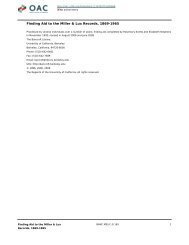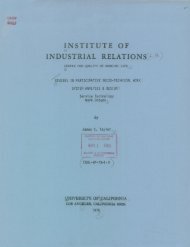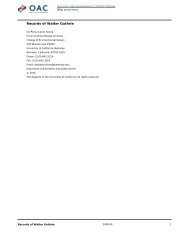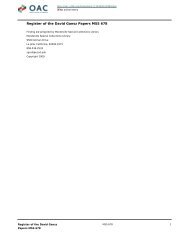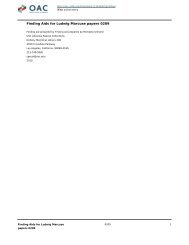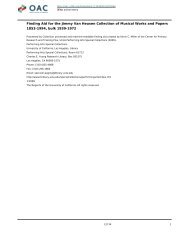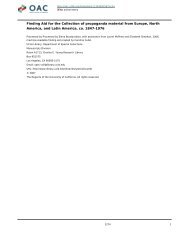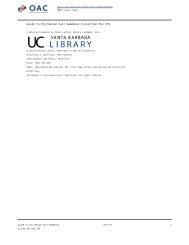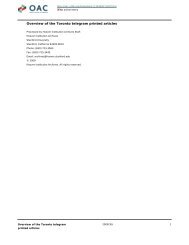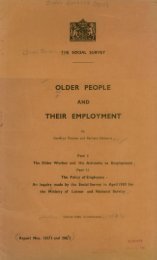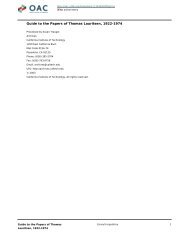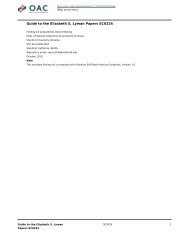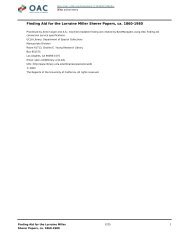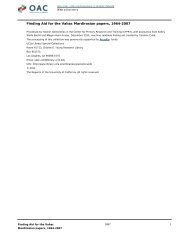Library of Social History collection
Library of Social History collection
Library of Social History collection
Create successful ePaper yourself
Turn your PDF publications into a flip-book with our unique Google optimized e-Paper software.
Institution <strong>Library</strong>.) United States materials are nevertheless voluminous, including issuances <strong>of</strong> rival organizations,<br />
materials on the trade-union, unemployed and women's movements, and a large number <strong>of</strong> Communist Party pamphlets.<br />
The other three series <strong>of</strong> the <strong>Library</strong> <strong>of</strong> <strong>Social</strong> <strong>History</strong> Collection are thematically related. The Cuban Revolutionary<br />
Government Series is devoted to speeches and writings <strong>of</strong> leaders <strong>of</strong> the revolutionary government that came to power in<br />
Cuba in 1959 under the aegis <strong>of</strong> the Movimiento Revolucionario 26 de Julio. The Nicaraguan Revolutionary Government<br />
Series covers speeches and writings <strong>of</strong> leaders <strong>of</strong> the Frente Sandinista de Liberación Nacional revolutionary government <strong>of</strong><br />
1979 to 1990 in Nicaragua. The Grenadian Revolutionary Government Series covers speeches and writings <strong>of</strong> leaders <strong>of</strong> the<br />
New Jewel Movement revolutionary government <strong>of</strong> 1979 to 1983 in Grenada. As might be expected in light <strong>of</strong> the durability<br />
<strong>of</strong> its subject, the Cuban Revolutionary Government Series is much the largest <strong>of</strong> these three. Speeches and writings <strong>of</strong><br />
Fidel Castro through 1991 alone account for more than 30 manuscript boxes. Arrangement <strong>of</strong> all three series is parallel.<br />
Within each series materials are listed alphabetically by name <strong>of</strong> individual revolutionary leader and thereunder in<br />
chronological order. Materials are printed in most cases, but derived from such diverse sources as to render the aggregate<br />
unique and its duplication impracticable. At the end <strong>of</strong> each series are materials not attributable to a single leader.<br />
Wherever possible these are listed alphabetically by issuing agency. The Grenadian Revolutionary Government Series also<br />
includes a micr<strong>of</strong>iche set <strong>of</strong> Grenadian documents captured by U.S. armed forces.<br />
All materials in the <strong>collection</strong> relating to Cuba, Nicaragua and Grenada are concentrated in the last three series.<br />
Consequently there are no entries for these countries in the Fourth International Series. A modest amount <strong>of</strong> material on<br />
Fourth International affiliates in Cuba and Nicaragua may be found in the Cuban and Nicaraguan Revolutionary Government<br />
Series respectively.<br />
Scope and Content <strong>of</strong> the Incremental Materials<br />
The Hoover Institution Archives acquired holdings <strong>of</strong> the <strong>Library</strong> <strong>of</strong> <strong>Social</strong> <strong>History</strong>, New York City, in 1991. A Register to the<br />
<strong>Library</strong> <strong>of</strong> <strong>Social</strong> <strong>History</strong> Collection was prepared in 2000 and remains the principal overall description <strong>of</strong> and finding aid to<br />
the <strong>collection</strong>. Since its preparation additional shipments <strong>of</strong> material have been received, boxes 266-307.<br />
The most significant portion <strong>of</strong> the addendum is the Nicaraguan Revolutionary Government Series, which is a continuation<br />
<strong>of</strong> the series <strong>of</strong> the same name in the main body <strong>of</strong> the <strong>collection</strong>. It consists <strong>of</strong> issuances <strong>of</strong> and materials about the Frente<br />
Sandinista de Liberación Nacional (FSLN) revolutionary government <strong>of</strong> Nicaragua from 1979 to 1990. Most <strong>of</strong> this material<br />
is printed or near-print but is derived from such diverse sources as to make it a uniquely valuable documentary resource. It<br />
includes documentation on the origins and early factional struggles within the FSLN prior to the revolution <strong>of</strong> 1979; writings<br />
<strong>of</strong> and biographical materials about the FSLN founder Carlos Fonseca Amador; statutes, <strong>of</strong>ficial reports and statistics<br />
documenting FSLN governmental programs; international assessments <strong>of</strong> the government's performance (mainly from<br />
academic journals and from left-wing theoretical journals); and documentation <strong>of</strong> the decline and fall <strong>of</strong> the FSLN<br />
government. It also includes many speeches, statements and interviews <strong>of</strong> FSLN government leaders, notably Daniel<br />
Ortega (president), Sergio Ramírez (vice president), Tomás Borge (minister <strong>of</strong> the interior), Humberto Ortega (minister <strong>of</strong><br />
defense), Ernesto Cardenal (minister <strong>of</strong> culture), Henry Ruíz (minister <strong>of</strong> planning), Jaime Wheelock (minister <strong>of</strong> agriculture<br />
and agrarian reform), Luís Carrión (deputy minister <strong>of</strong> the interior), Bayardo Arce, and Victor Tirado.<br />
Foldering <strong>of</strong> materials by the <strong>Library</strong> <strong>of</strong> <strong>Social</strong> <strong>History</strong> has been largely retained. Folders tended to fall into two<br />
categories-those whose contents were from the same narrow time frame and those whose contents had a common topical<br />
theme. The dual criteria <strong>of</strong> arrangement suggested division <strong>of</strong> the series into a Chronological Subseries and an Alphabetical<br />
(topical) Subseries. Most materials relating to the earliest period and to the latest period <strong>of</strong> FSLN history respectively will be<br />
found in the Chronological Subseries, while most materials relating to substantive activities <strong>of</strong> the FSLN while in<br />
government power during the intervening period will be found in the Alphabetical Subseries. Researchers will wish to<br />
consult both subseries, however.<br />
The General Subject File consists <strong>of</strong> material on a variety <strong>of</strong> topics relevant to international twentieth-century revolutionary<br />
movements. These include the Fourth International and its sections in various countries; Soviet anti-Trotskyism and political<br />
trials; social legislation in the Soviet Union; the Soviet-Yugoslav breach; the revolutionary governments <strong>of</strong> Cuba and<br />
Grenada; and revolutionary struggle in South Africa. The material consists mostly <strong>of</strong> pamphlets and other printed items, but<br />
there is also noteworthy unpublished material. This includes academic dissertations and other typescript studies; a<br />
multi-volume <strong>collection</strong> <strong>of</strong> writings by Ernesto Guevara, typeset but apparently unpublished; and a multi-volume<br />
documentary history <strong>of</strong> revolutionary movements in South Africa, likewise typeset but unpublished.<br />
A series <strong>of</strong> Monographs contains substantial printed volumes on similar subjects. Other books and serial runs have been<br />
incorporated into the holdings <strong>of</strong> the Hoover Institution <strong>Library</strong>.<br />
A small Audiovisual File includes miscellaneous items, notably a number <strong>of</strong> mounted photographs <strong>of</strong> Barcelona during the<br />
Spanish Civil War. There is also a small Oversize File.<br />
Subjects and Indexing Terms<br />
Register <strong>of</strong> the <strong>Library</strong> <strong>of</strong> <strong>Social</strong><br />
<strong>History</strong> Collection<br />
91004 3



